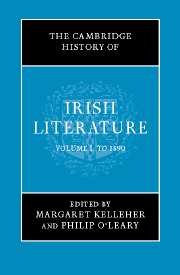Book contents
- Frontmatter
- Introduction
- 1 The literature of medieval Ireland to c. 800: St Patrick to the Vikings
- 2 The literature of medieval Ireland, 800–1200: from the Vikings to the Normans
- 3 The literature of later medieval Ireland, 1200–1600: from the Normans to the Tudors
- 4 Literature in English, 1550–1690: from the Elizabethan settlement to the Battle of the Boyne
- 5 Literature in Irish, c.1550–1690: from the Elizabethan settlement to the Battle of the Boyne
- 6 Prose in English, 1690–1800: from the Williamite wars to the Act of Union
- 7 Poetry in English, 1690–1800: from the Williamite wars to the Act of Union
- 8 Literature in Irish, 1690–1800: from the Williamite wars to the Act of Union
- 9 Theatre in Ireland, 1690–1800: from the Williamite wars to the Act of Union
- 10 Irish Romanticism, 1800–1830
- 11 Prose writing and drama in English, 1830–1890: from Catholic emancipation to the fall of Parnell
- 12 Poetry in English, 1830–1890: from Catholic emancipation to the fall of Parnell
- 13 Literature in Irish, 1800–1890: from the Act of Union to the Gaelic League
- 14 Historical writings, 1690–1890
- 15 Literature and the oral tradition
- Guide to major subject areas
- Index
- References
14 - Historical writings, 1690–1890
Published online by Cambridge University Press: 28 March 2008
- Frontmatter
- Introduction
- 1 The literature of medieval Ireland to c. 800: St Patrick to the Vikings
- 2 The literature of medieval Ireland, 800–1200: from the Vikings to the Normans
- 3 The literature of later medieval Ireland, 1200–1600: from the Normans to the Tudors
- 4 Literature in English, 1550–1690: from the Elizabethan settlement to the Battle of the Boyne
- 5 Literature in Irish, c.1550–1690: from the Elizabethan settlement to the Battle of the Boyne
- 6 Prose in English, 1690–1800: from the Williamite wars to the Act of Union
- 7 Poetry in English, 1690–1800: from the Williamite wars to the Act of Union
- 8 Literature in Irish, 1690–1800: from the Williamite wars to the Act of Union
- 9 Theatre in Ireland, 1690–1800: from the Williamite wars to the Act of Union
- 10 Irish Romanticism, 1800–1830
- 11 Prose writing and drama in English, 1830–1890: from Catholic emancipation to the fall of Parnell
- 12 Poetry in English, 1830–1890: from Catholic emancipation to the fall of Parnell
- 13 Literature in Irish, 1800–1890: from the Act of Union to the Gaelic League
- 14 Historical writings, 1690–1890
- 15 Literature and the oral tradition
- Guide to major subject areas
- Index
- References
Summary
There is general agreement among historians that 1690 marked a watershed in Irish history in general, but no such decisive break can be seen in historical writing. Many of the same themes and debates continued, notably over the nature of pre-colonial Gaelic society. These were sharpened by the incorporation of the wars and rebellions of the late sixteenth and seventeenth centuries into the available narrative, as evidence in support of the English colonial diagnosis of Edmund Spenser and Sir John Davies that the conquest had been imperfectly carried out and that consequently the native Irish remained fundamentally untouched by the civilising process. Oliver MacDonagh’s argument that early nineteenth-century historical writing lacked a ‘developmental or sequential view of past events’, and thus treated the past ahistorically as ‘an arsenal of weapons’ with which to fight contemporary political battles, can equally be applied to previous centuries. This also produced a habit of interpreting historical events and actions as if they were contemporary: ‘In such a view, no statute of limitations softens the judgement to be made upon past events, however distant [and] no prescriptive rights can be established by the passage of time, however lengthy.’ This concept of history as, in some ways, contemporaneous is to be found in almost all the texts discussed below.
Seventeenth-century legacies
The most prominent histories published in the immediate aftermath of the Williamite success came from the victors’ camp. They were characterised by a noticeable sense of history as an unfinished, still-unfolding process which incorporated the present in all its uncertainties. The pattern was established, when the out come of the Williamite wars was still unclear, in Hibernia Anglicana (1689–90) by Richard Cox (1650–1733).
- Type
- Chapter
- Information
- The Cambridge History of Irish Literature , pp. 599 - 632Publisher: Cambridge University PressPrint publication year: 2006
References
- 1
- Cited by



